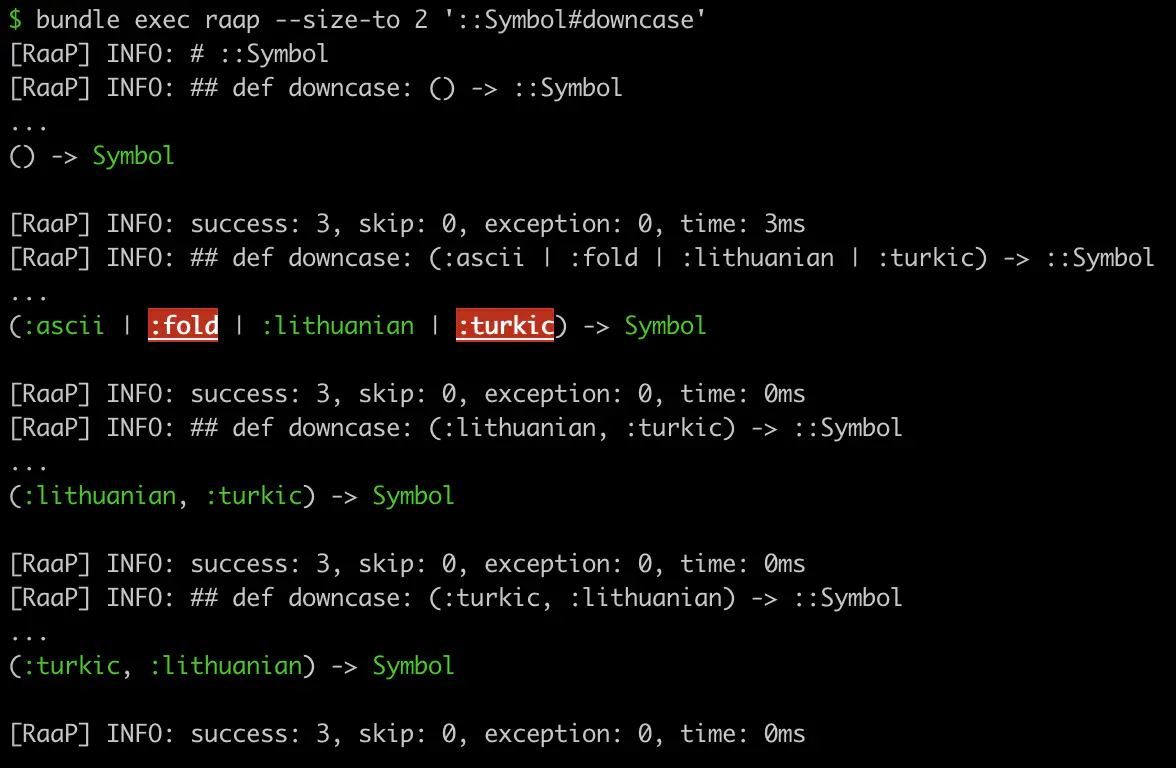RaaP
RBS as a Property
RaaP is a property based testing tool.
RaaP considers the RBS as a test case.
It generates random values for the method arguments for each type, and then calls the method.
The return value of the method is checked to see if it matches the type, if not, the test fails.
If you write an RBS, it becomes a test case.
Example
Concept
If you has next signature.
class Foo
end
class Bar
def initialize: (foo: Foo) -> void
def f2s: (Float) -> String
endThen, RaaP run next testing code automaticaly.
describe Bar do
let(:foo) { Foo.new }
let(:bar) { Bar.new(foo: foo) }
it "#f2s" do
100.times do |size|
float = Random.rand * size
expect(bar.f2s(float)).to be_a(String)
end
end
endIf you got a failure?
- Fix RBS
- Fix implementation of
Bar#f2s
Then, you can start loop again.
Finally, you get the perfect RBS!
Slide
https://speakerdeck.com/ksss/raap
Installation
Install the gem and add to the application's Gemfile by executing:
$ bundle add raap --require false
If bundler is not being used to manage dependencies, install the gem by executing:
$ gem install raap
Usage
$ raap 'MyClass' # Run only RBS of MyClass
$ raap 'MyClass::*' # Run each class under MyClass
$ raap 'MyClass.singleton_method' # Run only MyClass.singleton_method
$ raap 'MyClass#instance_method' # Run only MyClass#instance_method
$ raap 'MyClass' '!MyClass#skip' # Run methods MyClass without #skip
$ cat test/raap.txt
MyClass
!MyClass#skip
$ raap $(cat test/raap.txt) # You can manage the methods to be tested in a file
Log level definition
- error: Information on status of inability to continue execution.
- warn: Information on partial corrections required.
- info: A somewhat visualized representation of the execution state.
- debug: All information including stack traces.
Coverage
RaaP randomly selects a type and generates a value for optional and union types.
By default, displays the coverage of the type that actually produced the value.
The coverage display can help you determine if a correction is needed.
Meaning of colored types
- 🔴 Red: A type that has never been used to generate or validate a value.
- 🟡 Yellow: It is systematically difficult to determine if the type was used or not. (FIXME)
- 🟢 Green: The type used to generate and validate the value.
Size
Random values are determined based on size.
For example, an Integer with size zero is 0 and an Array is [].
RaaP, like other property-based tests, changes the size 100 times from 0 to 99 by default to generate test data.
Symbolic call
You may possibly see the following data structure in the debug logs.
[:call, Object, :method, [], {}, nil]This is a data structure of the state of the method call.
Symbolic call is a tuple beginning with :call, followed by the receiver, method name, positional arguments, keyword arguments, and block arguments, in that order.
And the receiver and arguments are nestable.
It is used in QuickCheck and Proper to keep as much history of method calls as possible.
Options
-I PATH or --include PATH
You can specify to load specify PATH as RBS.
--library lib
You can specify to load RBS library.
--require lib
You can specify require Ruby library.
--log-level level
You can specify log level (debug, info, warn or error).
--timeout sec
You can specify the number of seconds to consider a test case as a timeout.
--size-from int
You can specify size of start.
--size-to int
You can specify size of end.
--size-by int
You can specify size of step like Integer#step: (to: Integer, by: Integer).
--allow-private
By default, raap only validates public methods. However, by setting this option, it is possible to intentionally validate private methods in the RBS.
--preload path
Simply call Kernel.load.
However, this simplifies the preliminary preparation.
Preload examples
- Check signature of aws-sdk-s3
$ cat preload.rb
require 'aws-sdk-s3'
# Register initialize of `Aws::S3::Client` class.
RaaP::Type.register("Aws::S3::Client") do
[:call, Aws::S3::Client, :new, [], { stub_responses: true }, nil]
end
$ raap --preload ./preload.rb 'Aws::S3::Client#get_object'- Output ruby coverage by simplecov
$ cat preload.rb
require 'simplecov'
SimpleCov.command_name 'raap'
SimpleCov.start do
enable_coverage :branch
add_filter "/test/"
end
$ bundle exec raap --preload ./preload.rb -r my_class 'MyClass'First support is CLI
In RaaP, usage through the CLI is the primary support focus, and efforts are made to maintain compatibility. The use of the library's code (such as RaaP::Type) does not guarantee compatibility.
Achievements
RaaP has already found many RBS mistakes and bug in CRuby during the development phase.
- ruby/rbs#1704
- ruby/rbs#1706
- https://bugs.ruby-lang.org/issues/20292
- ruby/rbs#1768
- ruby/rbs#1769
- ruby/rbs#1770
- ruby/rbs#1771
- ruby/rbs#1779
- ruby/rbs#1783
- ruby/rbs#1789
- ruby/rbs#1790
- ruby/rbs#1793
Development
After checking out the repo, run bin/setup to install dependencies. You can also run bin/console for an interactive prompt that will allow you to experiment.
To install this gem onto your local machine, run bundle exec rake install. To release a new version, update the version number in version.rb, and then run bundle exec rake release, which will create a git tag for the version, push git commits and the created tag, and push the .gem file to rubygems.org.
Contributing
Bug reports and pull requests are welcome on GitHub at https://github.com/ksss/raap. This project is intended to be a safe, welcoming space for collaboration, and contributors are expected to adhere to the code of conduct.
License
The gem is available as open source under the terms of the MIT License.
Code of Conduct
Everyone interacting in the Raap project's codebases, issue trackers, chat rooms and mailing lists is expected to follow the code of conduct.
TODO
- Embed testing tool.
- Implement skip solution.
- Configure by YAML?
- Support recursive type.

